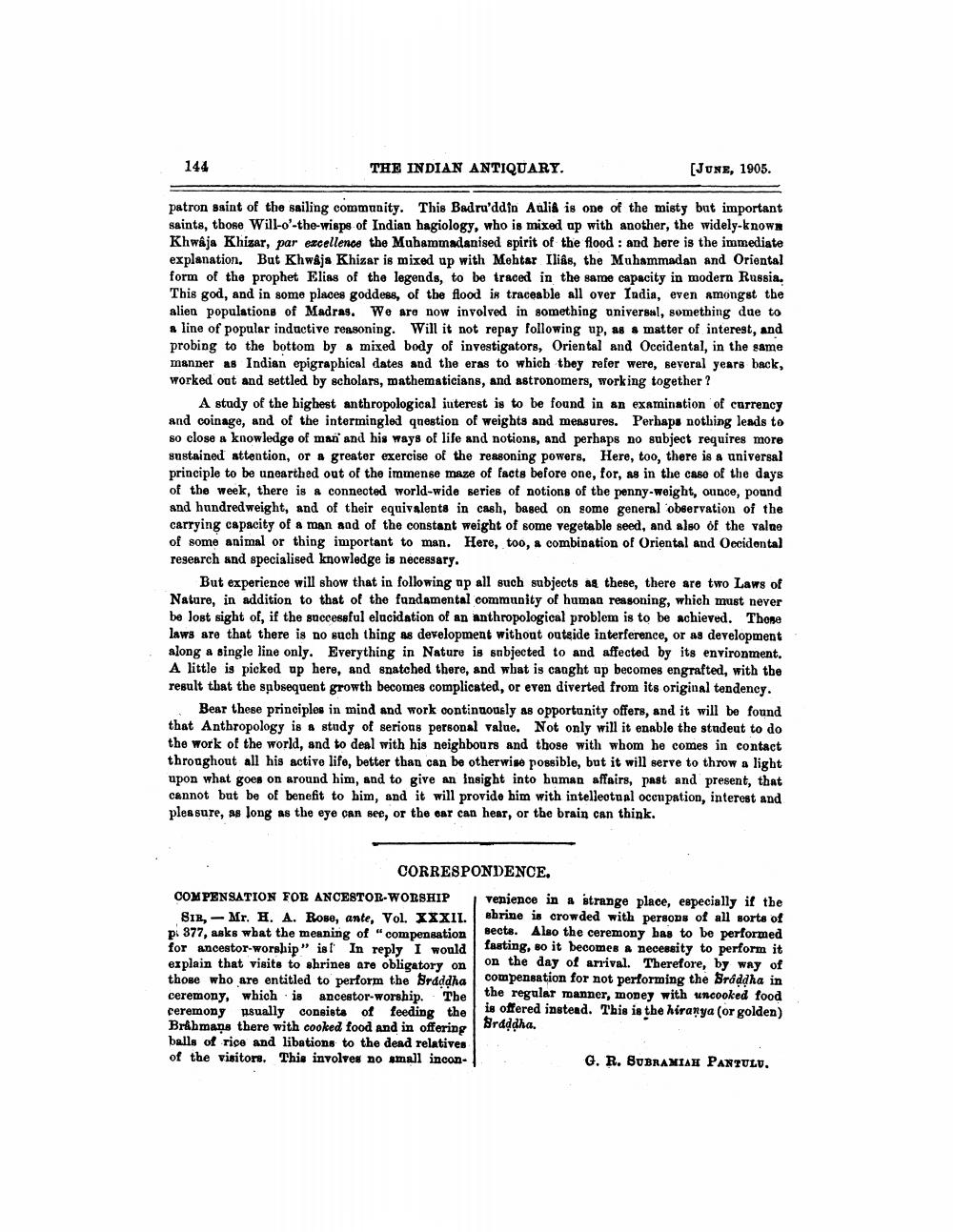________________
144
THE INDIAN ANTIQUARY.
(JUNE, 1905.
patron saint of the sailing community. This Badru'ddin Aulis is one of the misty but important saints, those Will-o'-the-wisps of Indian hagiology, who is mixed ap with another, the widely-known Khwaja Khizar, par excellence the Muhammadanised spirit of the flood : and here is the immediate explanation. But Khwaja Khizar is mixed up with Mehtar Ilias, the Muhammadan and Oriental form of the prophet Elias of the legends, to be traced in the same capacity in modern Russia. This god, and in some places goddess, of the flood is traceable all over India, even amongst the alien populations of Madras. We are now involved in something universal, something due to a line of popular indactive reasoning. Will it not repay following up, as a matter of interest, and probing to the bottom by a mixed body of investigators, Oriental and Occidental, in the same manner as Indian epigraphical dates and the eras to which they refer were, several years back, worked out and settled by scholars, mathematicians, and astronomers, working together ?
A study of the highest anthropological interest is to be found in an examination of currency and coinage, and of the intermingled question of weights and measures. Perhaps nothing leads to so close a knowledge of man and his ways of life and notions, and perhaps no subject requires more sustained attention, or a greater exercise of the reasoning powers, Here, too, there is a universal principle to be unearthed out of the immense maze of facts before one, for, as in the case of the days of the week, there is a connected world-wide series of notions of the penny-weight, ounce, pound And hundredweight, and of their equivalents in cash, based on some general observation of the carrying capacity of a man and of the constant weight of some vegetable seed, and also of the value of some animal or thing important to man. Here, too, a combination of Oriental and Occidental research and specialised knowledge is necessary.
But experience will show that in following up all such subjects as these, there are two Laws of Nature, in addition to that of the fundamental community of human reasoning, which must never be lost sight of, if the successful elucidation of an anthropological problem is to be achieved. Those laws are that there is no such thing as development without outeide interference, or as development along a single line only. Everything in Nature is subjected to and affected by its environment. A little is picked up here, and snatched there, and what is caught up becomes engrafted, with the result that the subsequent growth becomes complicated, or even diverted from its original tendency.
Bear these principles in mind and work continuously as opportunity offers, and it will be found that Anthropology is a study of serions personal value. Not only will it enable the studeut to do the work of the world, and to deal with his neighbours and those with whom he comes in contact throughout all his active life, better than can be otherwise possible, but it will serve to throw a light upon what goes on around him, and to give an insight into human affairs, past and present, that cannot but be of benefit to him, and it will provide him with intellectual ocenpation, interest and pleasure, as long as the eye can see, or the oar can hear, or the brain can think.
CORRESPONDENCE, COMPENSATION FOR ANCESTOR-WORSHIP venience in a strange place, especially if the
SIE, - Mr. H. A. Rose, ante, Vol. XXXII. shrine is crowded with persons of all sorts of pi 877, asks what the meaning of "compensation Bects. Also the ceremony has to be performed for ancestor-worship" ist In reply I would
fasting, so it becomes a necessity to perform it explain that visits to shrines are obligatory on
on the day of arrival. Therefore, by way of those who are entitled to perform the Braddha compensation for not performing the Braddha in ceremony, which is ancestor-worship. The the regular manner, money with uncooked food ceremony usually consists of feeding the
is offered instead. This is the hiranya (or golden) Bribmana there with cooked food and in offering
Sraddha. balls of rice and libations to the dead relatives of the visitors. This involves no small incon
G. R. SUBRAMIAH PANTULU.




